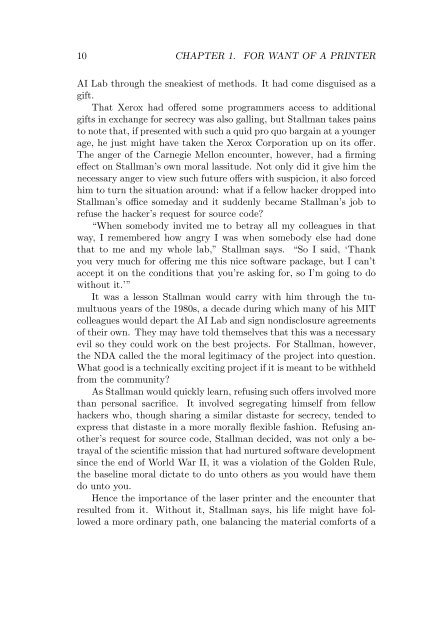You also want an ePaper? Increase the reach of your titles
YUMPU automatically turns print PDFs into web optimized ePapers that Google loves.
10 CHAPTER 1. FOR WANT OF A PRINTER<br />
AI Lab through the sneakiest of methods. It had come disguised as a<br />
gift.<br />
That Xerox had offered some programmers access to additional<br />
gifts in exchange for secrecy was also galling, but Stallman takes pains<br />
to note that, if presented with such a quid pro quo bargain at a younger<br />
age, he just might have taken the Xerox Corporation up on its offer.<br />
The anger of the Carnegie Mellon encounter, however, had a firming<br />
effect on Stallman’s own moral lassitude. Not only did it give him the<br />
necessary anger to view such future offers with suspicion, it also forced<br />
him to turn the situation around: what if a fellow hacker dropped into<br />
Stallman’s office someday and it suddenly became Stallman’s job to<br />
refuse the hacker’s request for source code?<br />
“When somebody invited me to betray all my colleagues in that<br />
way, I remembered how angry I was when somebody else had done<br />
that to me and my whole lab,” Stallman says. “So I said, ‘Thank<br />
you very much for offering me this nice software package, but I can’t<br />
accept it on the conditions that you’re asking for, so I’m going to do<br />
without it.’”<br />
It was a lesson Stallman would carry with him through the tumultuous<br />
years of the 1980s, a decade during which many of his MIT<br />
colleagues would depart the AI Lab and sign nondisclosure agreements<br />
of their own. They may have told themselves that this was a necessary<br />
evil so they could work on the best projects. For Stallman, however,<br />
the NDA called the the moral legitimacy of the project into question.<br />
What good is a technically exciting project if it is meant to be withheld<br />
from the community?<br />
As Stallman would quickly learn, refusing such offers involved more<br />
than personal sacrifice. It involved segregating himself from fellow<br />
hackers who, though sharing a similar distaste for secrecy, tended to<br />
express that distaste in a more morally flexible fashion. Refusing another’s<br />
request for source code, Stallman decided, was not only a betrayal<br />
of the scientific mission that had nurtured software development<br />
since the end of World War II, it was a violation of the Golden Rule,<br />
the baseline moral dictate to do unto others as you would have them<br />
do unto you.<br />
Hence the importance of the laser printer and the encounter that<br />
resulted from it. Without it, Stallman says, his life might have followed<br />
a more ordinary path, one balancing the material comforts of a


